
Yesterday we examined the first 18 verses of John, his prologue to the story of the Messiah. Starting in verse 19 of chapter one we enter the first of four stories about the Messiah. This first cycle is The Peaceful First Coming of the Messiah (1.19-4.54). At the start we are dropped into a day in the life of John the Baptist who is being challenged by the Pharisees in a way that bears resemblance to how Jesus will be questioned by this same band of religious leaders. Unlike Jesus, John answers them without riddles or questions of his own.
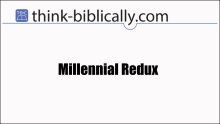
Previously we've reported information from Pew Research that Millennials are less religious than the generations before them. According to Pew, a third of the millennial generation doesn’t pray and only a little over a quarter of them attend at least one religious service per week. The majority of those surveyed also claimed that religion isn’t very important to them, identifying with the statement that it is “not too” or “not at all” important in their lives. We stated then that we had no reason to question the survey, and that Pew is normally a reliable polling service. That was then.

"Media" used to mean "print media" like books and newspapers, but the world has grown. Today media can also mean radio, television and movies delivered to personal computers, tablets and cell phones. As the world's best selling book of all time the Bible continues to make headlines, both good and bad, across all forms of media: Alyssa Milano finally says something smart, Mike Pence echoes the sentiments of this site, socialist countries around the world provide ideas for America's Democrat party, and a church gives hope and a salvation message to the people of its fair city.
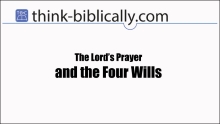
There are so many sermon's and articles that could be written concerning the content of this prayer, and will be I'm sure. I'm adding this to the pile. There are at least three, possibly four distinct entities mentioned in this prayer that are common themes not only throughout Matthew's gospel but the entire Bible. Notice the progression, from heaven through earth to hell in the development of the "wills". First, there is the will of the father, in asking for daily bread our will is exposed, in forgiving others the will of our new nature comes to the fore...

The most famous opening lines of any piece of literature of any age are those of Genesis, "In the beginning..." It's fame is attributed not to its ancient origins or to its religious importance, but to its addressing an issue that all people wonder about. How did all this begin? Greek philosophy started because they wanted to know what was the first substance, the thing from which everything came from. To this day the question remains. Those who reject God believe in a primordial soup from which everything came from, with no idea of what its ingredients are. Origins is the ultimate investigation.

So much happens in life. Sometimes we receive bad news like the death of a loved one, news about having a terrible disease, or loosing a job and sometimes we get great news like the birth of a new family member, finding out you don't have a terrible disease or finding a job. We never know what is around the next corner, the good or the bad, but there is one constant in both cases: God is present. Pursuing God's presence may sound like the title of a new book by some mega-church pastor, but nay, it is the topic of today's study.

A few months ago we ended a series examining many of the names of God and how those names reveal something important about his character. Yesterday we talked about how important the names of people can be, so much so that in a few instances God specifically told parents what to name their children (there are far more instances of this than we examined). Today we'll look at two examples where God changes people's names, specifically Abraham and Sarah. In each case God changes only one letter of their name. It makes one wonder, why bother? What difference does it make?
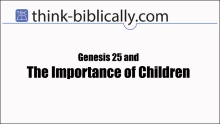
I've been traveling a lot for work lately, which explains why we missed a few posts a couple weeks ago. While on the trip I went for breakfast one morning at IHOP. When the host directed me to the my table I asked her, can I have a table that's not right next to the giant family? She was about to seat me behind a noisy group consisting of four adults, two toddlers, and two infants. As I sat at a table half way across the room I thought to myself, I don't really like kids.

It's nearly summer, and readers of this site know that means its time for a series on a book of the Bible. This summer we'll be working our way through the Gospel of John, of which our previous post "A Geek Like Me" may be considered as an introduction. In all my years of teaching the Bible I've never taught through this book, so I am approaching it with careful observation. As always, I appreciate reader feedback through our Facebook Group. Please let me know if you disagree with my conclusions or reasoning or have any knowledge that should be added.
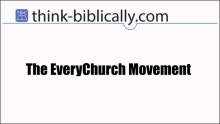
Every once in a while there comes along an organization or a coalition that deems to do something amazing. Few have the resources to pull it off. If we've learned anything from those who do evil, it is that the Internet can be a pwerful tool to bring like-minded people together to do what they could not do alone. A Christian organization — several, actually — are working to do something wonderful for the kingdom and are inviting others to be a part. It is called the EveryChurch, and it was started as a joint operation by Cru and Intervarsity.

It is a question meant to strike fear in the heart of the person asked, and to convince witnesses that a conspiracy is afoot: "What did he know and when did he know it?" It was born during the Watergate investigation and has been a favorite weapon of politicians and journalists alike. Early in the pages of the Bible, the careful reader may have noticed one instance where this question might be asked and it concerns one of the Bible's most well-known characters, Noah. The famous ark-builder isn't the subject of this investigation, however, it's his father Lamech.
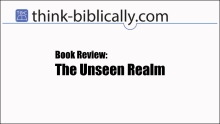
I've been reading a fascinating work by Dr. Michael S Heiser titled, The Unseen Realm. It is a lengthy work that covers a great many topics along a common theme — describing a possible organization of powers and kingdoms in the spiritual world. Due to its complexity, I won't be providing a detailed book review but I'd like to let others know what to expect should they have an interest in picking up this well researched tome. There is a lot to like about this non-fiction work, even though I don't agree with everything in it, but I have one primary criticism.

